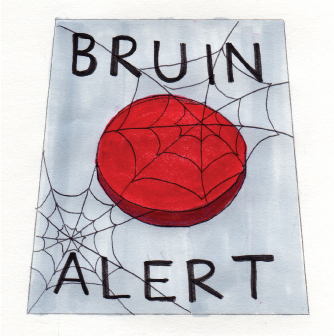Westwood keeps one-upping itself this quarter. An armed robbery was followed by a three-hour imprisonment. Then, both were topped by an underground explosion that shattered windows nearby.
North Village residents must feel like they have seen it all lately. Yet, they surprisingly did not see a BruinAlert text message about any of the recent events ““ an inexcusable absence.
The BruinAlert system, which notifies the campus community of potential dangers, is meant primarily for on-campus emergencies, said David Burns, UCLA’s emergency preparedness manager.
Burns, self-described as “the guy who pushes the button” to send the notifications, said that for an off-campus situation to be alert-worthy, it must be an immediate threat to a large group of individuals.
But no alert was sent the night before classes began this quarter when an armed criminal left the scene of a robbery and set foot on streets crowded by students returning from break.
The system has been used in five situations so far: an earthquake, a wildfire, two separate suspicious packages, and the stabbing last quarter.
When the text message was sent regarding the stabbing incident in October, the alleged attacker was already in custody, so students were no longer in immediate harm.
The alert was sent anyway to inform the campus of a significant event and to avoid speculation, said Nancy Greenstein, director of community services for the university police.
It makes sense to use BruinAlert to clarify such a significant event. But by that logic, a clarification message should have been sent following the explosion, as many of the campus members were left confused, scared and without power for hours.
“I was in the Humanities Building and I could feel the walls shake. I had no idea what it was,” said David Bress, a fourth-year communication and political science student. A simple text message could have let Bress know that there was nothing to worry about.
While the BruinAlert system was a wise investment made by UCLA after the Virginia Tech shootings, it should be used more frequently with better technological capabilities.
It is great that we can get in touch with more than 60,000 people within minutes. But an obvious flaw is that it’s an all or nothing system. Messages are sent either to all of the people enrolled or nobody at all.
One reason no alerts were sent after the armed robbery and the explosion was that the entire UCLA community was not affected, according to Burns. Warning residents not living in the North Village would have just caused unnecessary fear and confusion.
The system should be divided geographically so that regional notifications can be sent only to people in each area. This would allow for more efficient use of the system in areas surrounding the campus. Natural regional splits already exist: the Hill, North Village, the Hilgard area, south of Wilshire, and Westwood Village. Individuals signing up for the system should be able to easily select which regional alerts they would like to receive.
Greenstein, who wrote her doctoral dissertation on timely warnings for the campus community, added that sending too many messages will make them less valuable.
But I’m not asking for a text message every time a bike is stolen.
I am, however, asking to know about armed criminals and an explosion blocks from my apartment, no matter what frequency.
On a bright note, we, as a campus, did save a few thousand dollars by not sending those alerts, as each text message costs the university 8 cents.
UCLA has already spent millions on this warning system, and it’s collecting unnecessary dust. Maybe we should use it for the next crazy Westwood occurrence.
Do you think UCLA should get an unlimited texting plan? E-mail Ramzanali at aramzanali@media.ucla.edu. Send general comments to viewpoint@media.ucla.edu.
